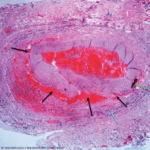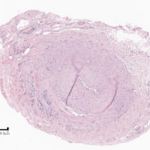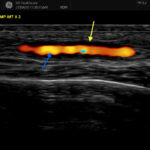A study identifies ultrasound as a safe, accessible & cost-effective alternative for longitudinal aortic surveillance in patients with GCA.


Katie Robinson |
A study identifies ultrasound as a safe, accessible & cost-effective alternative for longitudinal aortic surveillance in patients with GCA.

Philip Seo, MD, MHS |
Dr. Philip Seo highlights the latest research into the assessment and treatment of giant cell arteritis presented during ACR Convergence 2025.

Supported by data in patients with new-onset and relapsing giant cell arteritis (GCA), the FDA approved upadacitinib for the treatment of adults with GCA.

Philip Seo, MD, MHS |
The large vessel vasculitides were a major focus of the 21st International Vasculitis Workshop held in Barcelona in April. The biennial conference brings together specialists from multiple disciplines, including rheumatology, nephrology and immunology, to discuss cutting-edge vasculitis research. This article reviews important points regarding the pathogenesis, diagnosis and management of both giant cell arteritis and…

Should all patients with polymyalgia rheumatica (PMR) have a vascular ultrasound assessment? What treatments are the safest and most efficacious for patients with PMR? Frank Buttgereit, MD, answered these questions and highlighted the latest research on PMR in this session at EULAR 2024.

Moayad Alqazlan, MBBS, Vidhya Nair, MBBS, MD, & Michael A. Seidman, MD, PhD |
At the end of 2023, the Society for Cardiovascular Pathology (SCVP) published consensus guidelines on the diagnostic approach to temporal artery biopsy.1 Through this publication, SCVP hopes to bring more uniformity to the processing, interpretation and reporting of these specimens, taking into consideration the most up-to-date literature available. These guidelines have obvious impact on clinical…

Colm Kirby, MB, BCh, BAO, MRCPI, Rachael Flood, MB, BCh, BAO, MRCPI, Ronan Mullan, MB, BCh, BAO, MRCPI, Grainne Murphy, MB, BCh, BAO, MRCPI, & David Kane, MB, BCh, BAO, MRCPI |
Background/Purpose It has been reported that 20–50% of patients with polymyalgia rheumatica (PMR) have subclinical giant cell arteritis (GCA). The natural history of ultrasound-defined subclinical GCA in PMR is not known. Methods Twenty-five newly diagnosed PMR patients who met a clinical diagnosis for PMR, verified by two rheumatologists, were examined by ultrasound. All six branches…

Jessica Meek, MD, Anna Coppinger, DO, & Sejal Khan, DO |
Thromboembolic events are major contributors to the morbidity and mortality of patients with giant cell arteritis (GCA), but little is known about how GCA may increase the risk of ischemic strokes. GCA-related stroke is described as an ischemic cerebral infarct occurring within three to four weeks of GCA diagnosis and treatment. It occurs in 3–7%…

Michael Putman, MD |
In 2021, the ACR—in concert with the Vasculitis Foundation (VF)—released four new vasculitis guidelines, one each on: 1) anti-neutrophil cytoplasmic antibody (ANCA) associated vasculitis, 2) giant cell arteritis (GCA) and Takayasu arteritis, 3) polyarteritis nodosa and 4) Kawasaki disease. The guideline development process is complex. For the vasculitis guidelines, this process kicked off in June…

Brendan Antiochos, MD, provided a timely update on research and treatments related to vasculitis, addressing treatments for ANCA-associated vasculitis and giant cell arteritis, COVID-19 vaccination and more.